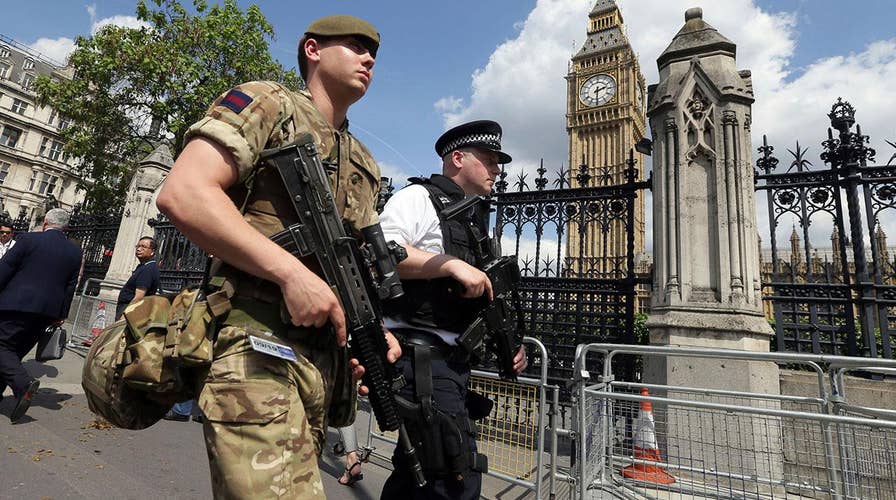British military deployed amid ‘imminent’ U.K. terror threat
In the wake of the terror attack in Manchester, the British military was deployed to replace armed police guarding key sites after the terror level in the U.K. was elevated to its highest level
British authorities were in a frantic race to find the mastermind who fashioned the deadly bomb used in Monday's terror attack in Manchester, as the nation was braced for a new strike that could be "imminent."
Police believe 22-year-old Salman Abedi was given the explosive he used to kill himself and 22 others at a concert by pop singer Ariana Grande. A fifth suspect was arrested Wednesday, with four in custody already in connection with the incident. Police are assessing a "package" the fifth suspect was carrying.
British authorities continued to conduct "extensive" searches while investigating the "network" behind the attack.
"It is very clear that it is a network we are investigating," Manchester police said on Wednesday.
British officials said they deployed nearly 1,000 military troops at high-profile sites in the country, some in London, instead of police. Manchester police said the increase in threat level gave the green light to deploy military support operation under the code name "Temperer."
Multiple law enforcement agencies swept through Manchester in a bid to head off a follow-up to the ghastly attack. Manchester police said they will continue doing "extensive" searches to disband the "network" of suspects. Officials also raised the number of wounded Wednesday to 119.
Soldiers were replacing armed police on Wednesday at sites like Buckingham Palace, 10 Downing Street and Parliament. London Police Commander Jane Connors said the goal was to "make our city as hostile an environment as possible for terrorists to plan and operate." She said police also would be ready to respond quickly to any incidents with armed officers, and have added more armed police walking patrols.
The Islamic State has claimed responsibility for the attack, calling Abedi a "soldier of the caliphate." Abedi was believed to have traveled to Syria and had "proven" links with ISIS, French Interior Minister Gerard Collomb said Wednesday on BFM television, adding that British and French intelligence have information that Abedi had been to Syria. He did not provide details, and said it was unclear whether Abedi was part of a larger network of attackers.
Abedi's father told The Associated Press that his son was in Libya a month-and-a-half ago and was preparing to visit Saudi Arabia. Living in Tripoli, Ramadan Abedi said that his family "aren't the ones who blow up ourselves among innocents."
In addition to the three arrests in the south of Manchester, police also handcuffed a man at a house just a 10-minute walk from Abedi's home -- but they did not immediately confirm it was connected to the concert bombing. "There was a policeman, armed policeman, shouting at my neighbor ... and I realized there is something wrong here ... they arrested the father, and I think the rest of the family kind of disappeared," neighbor Omar Alfa Khuri said, adding that he knew the arrested man from the local mosque.
Abedi had been known to security forces "up to a point," Home Secretary Amber Rudd said.
Prime Minister Theresa May Wednesday chaired a meeting of her emergency security cabinet group, known as COBRA, to review intelligence reports about Abedi and concerns that he might have had outside support.
Britain raised its threat level to "critical," which May said means an attack could come at any time. "This means that the assessment is that, not only is a further attack likely, but that it could be imminent."
DOZENS STILL HOSPITALIZED AFTER ATTACK
Police raided Abedi's house earlier, using a controlled explosion to blast down the door. Neighbors recalled him as a tall, thin young man who often wore traditional Islamic dress and did not talk much.
Police also raided and searched a property elsewhere in Manchester where Abedi's brother Ismail is thought to have lived. A 23-year-old man has also been arrested as part of the investigation but officials have released no details about him.
British soldiers have been deployed in place of police officers to guard high-profile sites such as Buckingham Palace and Parliament.
Abedi was born in Britain to a Libyan family, grew up in Manchester's southern suburbs and attended the local Salford University for a time.
Officials are looking into how often Abedi had traveled to Libya, which has seen an eruption of armed Islamist groups since dictator Moammar Qaddafi was overthrown and killed in 2011. British officials have not commented on whether Abedi had links to ISIS or other extremist groups.
In addition to those killed in the concert attack, 64 people are being treated for their wounds, Jon Rouse of the Greater Manchester Health and Social Care Partnership said Wednesday.
He said some of the wounded had been discharged, but that the number of patients being treated had increased due to "walking wounded" who came in hours after the attack. Rouse said many of those hospitalized had serious wounds that would require "very long term care and support in terms of their recovery."
Collomb, who spoke with May after the attack, said the two countries should continue cooperating closely on counterterrorism efforts despite Britain's pending exit from the European Union.

